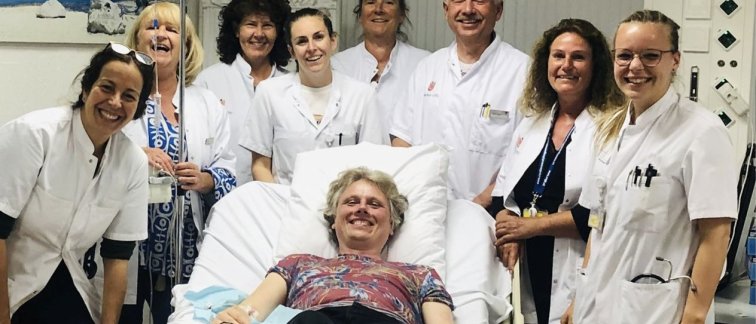“This HAE patient has been known to us for many years,” says Danny Cohn. “This hereditary disease runs in his family, which gives him extra motivation to participate in this research. He had been looking forward to this moment for over a year. He follows the developments closely and is active in the patients' association.” Cohn followed and supervised the treatment from hour to hour via a video connection from Bonaire. “The CRISPR-Cas9 therapy was administered via infusion; the drug is absorbed into the liver, where it suppresses the production of the kallikrein protein.”
Getting life back
Hereditary angioedema is a rare genetic disorder caused by deficiency of the protein C1-esterase inhibitor. Without this inhibitor, the levels of the messenger protein kallikrein increase. This can cause sudden swelling in many parts of the body. That may sound more innocent than it is, explains Cohn: “When I became a practitioner five years ago, I saw how this condition can dominate the lives of patients who are otherwise healthy. That motivated me to look for better treatments. If this treatment works, they will have their lives back."
International center of expertise
Amsterdam UMC houses the international expertise center (of the European Reference Networks for rare hereditary diseases) and is therefore also the national reference center of HAE. "There are over 100 HAE patients who are treated here," says Cohn. The degree to which they are ill varies, but it occurs that the swellings are disabling, painful or life-threatening. "Patients can suffer from extremely severe abdominal pains, which can take days to get rid of," he illustrates. "And if it is a swelling of the airways, it can even lead to suffocation."
DNA 'scissors'
Until now, attacks could only be temporarily suppressed with drugs. CRISPR-Cas9 changes this. To explain how it works, Cohn draws a comparison with the air alarm we hear on the first Monday of every month. "Imagine that the air alarm goes off so often due to a malfunction, and that you couldn't manage to turn off the main system. Then you could make sure that the local speakers could no longer transmit the sound signal of the main installation. CRISPR-Cas9 suppresses the production of an important messenger protein (prekallikrein), so that the signal that leads to swelling can no longer be passed on."
In cells, CRISPR-Cas9 acts like a pair of scissors, which can cut away a piece of incorrect DNA. Originally, these scissors were a defense mechanism used by bacteria to protect themselves against viruses. As soon as the virus enters bacteria, the bacteria cut away the virus DNA. Cohn: "This also works in humans. There are two simple ways to do this: cut out a piece of the wrong DNA and leave it out, or replace it with healthy DNA. We use the first technique, which is called 'loss of function'."
The right dose
Danny Cohn followed the treatment that his fellow researchers Lauré Fijen and Daniela Stols-Gonçalves carried out with the nurses from hour to hour via a video link. "He was the fifth patient worldwide; in New Zealand, the first four people had just been treated. The first three received a lower dose. This is phase 1 of the drug trial, which looks at what dose is safe and effective. The first three went well, then three people were given a higher dose, including our patient. We expect that this is the right dose." In the next research phases it will be examined whether this dose also works well in larger groups of patients. This will be followed by a third phase and then by the registration process. It is therefore not yet known when the treatment will be available for all patients with severe HAE.
Cure
For now it remains to be seen whether this treatment will indeed cure patients completely, as the researchers hope and also expect. Earlier this year, Cohn's research group reported in the New England Journal of Medicine that temporary suppression of the messenger protein led to a dramatic decrease in attacks. Cohn: "By suppressing this protein even more and permanently with CRISPR-Cas9, a cure is now within reach."
Photo: Nanet Sons
Text (in Dutch): Marleen Kamminga

